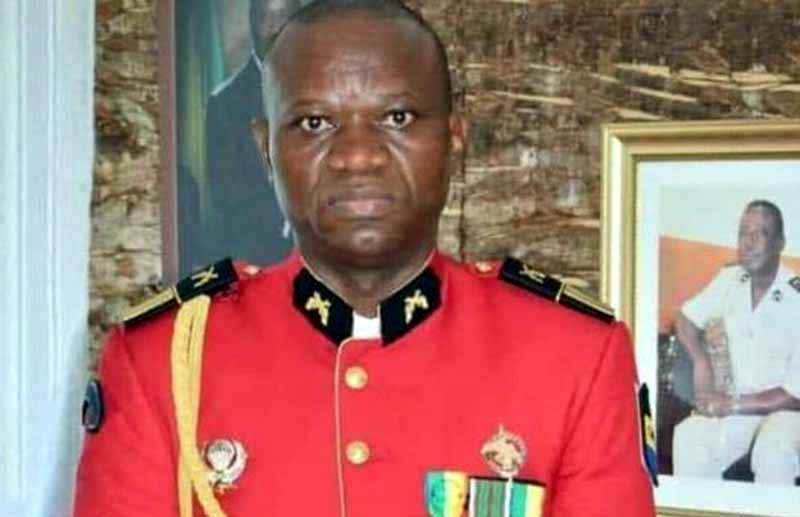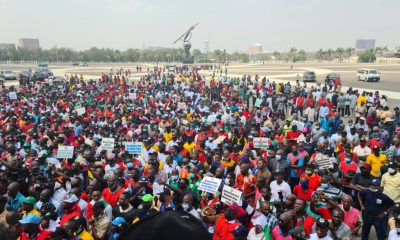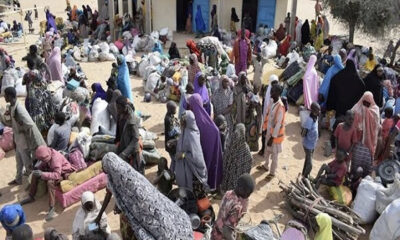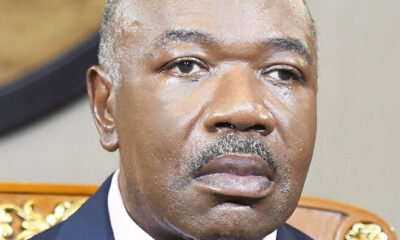Africa
Coup: African Union suspends Gabon

Coup: African Union suspends Gabon
The African Union (AU) has suspended Gabon’s membership in the wake of the coup in the Central African country.
AU’s Peace and Security Council said on Thursday evening that it strongly condemned the take-over of power by the military in Gabon, which deposed President Ali Bongo.
It suspended Gabon’s participation in all activities of the AU and its institutions “with immediate effect until constitutional order is restored in the country.”
The AU suspended Niger Republic’s membership just a few weeks ago after the military took power there at the end of July.
Burkina Faso, Mali, Guinea and Sudan have also been suspended since the coups in those countries.
READ ALSO:
-
X will soon have video, audio calls features – Elon Musk
-
Military troop neutralises 39 terrorists, apprehends 157 others in two weeks
-
We’re fully behind you, Russian delegation tells Burkina Faso’s coup leaders
In Brussels, top EU diplomat Josep Borrell said the European Union “rejects any seizure of power by force in Gabon.”
“The challenges facing Gabon must be resolved in accordance with the principles of the rule of law, constitutional order and democracy,” Borrell wrote on Thursday in a statement.
“The country’s peace and prosperity, as well as regional stability, depend on it,” the statement added.
He called for “inclusive and substantive dialogue” instead of force to respect the rule of law, human rights and the will of the Gabonese people.
The military had seized power in Gabon early on Wednesday.
Officers announced on state television that state institutions had been dissolved.
They added that results of the recent election had been annulled as they were fraudulent and the country’s borders were closed.
Shortly before, the electoral authorities had declared Bongo, who had been in office since 2009, the winner of the Aug. 26 election.
Military leaders named the head of the Presidential Guard, Brice Clotaire Oligui Nguema, as the country’s interim leader on Wednesday evening.
Coup: African Union suspends Gabon
(dpa/NAN)
Africa
Man who has lived in America for over 13 years says he’s tired, wants to return home

Man who has lived in America for over 13 years says he’s tired, wants to return home
After 13 years of residing in the United States of America, a Kenyan man has expressed his strong desire to return to his homeland.
The man, whose identity remains undisclosed, reportedly relocated to the US in 2011, initially serving in the military for four years before transitioning into corporate employment.
During his time in the US, he held various positions, including a deployment in Afghanistan, and was earning a substantial salary of $12,000 per month.
READ ALSO:
- May Day: A’Ibom gov increases minimum wage to N40,000
- El-Rufai ignored us for 8 years, Kaduna NLC praises Gov Sani
- Umahi replies Obi over Lagos-Calabar coastal project criticism
However, despite the financial security, he found himself grappling with a sense of unfulfillment, realizing that he was sacrificing his most valuable asset (time) for a pursuit that left him with little satisfaction.
In December of the previous year, he reportedly resigned from his corporate job and delve into entrepreneurship, seeking freedom and autonomy in his endeavors.
Man who has lived in America for over 13 years says he’s tired, wants to return home
Africa
23 killed in violent clashes over cattle in South Sudan

At least 23 people were killed and 44 were injured in violent clashes between different ethnic groups over cattle theft in South Sudan, a local official said on Tuesday.
Heavily armed cattle thieves attacked a village in the state of Eastern Equatoria, a local administration spokesman said.
Hundreds of cattle were stolen during the raid.
READ ALSO:
- U.S. Court fines Trump $9,000 for violating gag order
- FG set to repatriate 20,000 Nigerians from Chad, Cameroon
- UK-based Nigerian doctor loses licences over sex for free Botox injections
Seven children and five women were also abducted during the attack.
Members of the Murle ethnic group were armed with machine guns and other rapid-fire weapons, he said.
The latest incident comes after other, deadly attacks relating to cattle theft in South Sudan.
Several ethnic groups in South Sudan breed cattle, with farming not only key for economic reasons and critical to prosperity, but also deeply embedded in their culture.
23 killed in violent clashes over cattle in South Sudan
(dpa/NAN)
Africa
Electricity crisis forces Energy minister to resign

Electricity crisis forces Energy minister to resign
Following weeks of disruption, electricity supply has been finally restored in most cities across Sierra Leone after a part payment was made for the $48m (£38m) utility bill it owed to a Turkish company, Karpowership.
The payment of the sum of $18m comes as the country’s energy minister, Kanja Sesay announced his exit from government, saying he took full responsibility for the crisis.
Most electricity supplies to the capital, Freetown, is generated from a Turkish ship floating off the country’s coast.
Last week, Karpowership said it had severely cut supplies to the city, from 60 megawatts to 6 megawatt, citing backlog of unpaid bills.
Residents of the country’s main cities have been going for days on end without any power and hospitals have also been affected.
READ ALSO:
- Why I broke down in tears – Saudi Arabia maid impregnated by boss narrates ordeal
- BREAKING: Popular Gospel singer Morenikeji ‘Egbin Orun’ is dead
- Two arrested for torturing 60-year-old man to death in Anambra
At least one infant has died because of a lack of power, while medics have been using mobile phones to provide light as they carry out procedures, Reuters news agency quotes a doctor as saying.
“How do you iron your clothes, how do you make your food, how do you go to sleep? We pay our electricity bills so I don’t see why we should be forced to live like this,” BBC quoted a second-year engineering student in Freetown, Fatmata Gassim as saying.
Following the resignation of Sesay, the office of President Julius Maada Bio said the energy ministry would now fall under the direct supervision of the president.
Karpowership previously cut supplies to Sierra Leone in September over unpaid bills.
It is one of the world’s biggest floating power plant operators, with several African states relying on it for electricity.
In October, it briefly cut power to Guinea-Bissau, saying it had no option “following a protracted period of non-payment”.
Electricity crisis forces Energy minister to resign
-

 metro3 days ago
metro3 days agoLabour Day: Nigerian workers are dedicated, resilient, says NURTW leader
-

 Auto2 days ago
Auto2 days agoAppeal court takes over NURTW case as NIC withdraws
-

 News3 days ago
News3 days agoFG approves salary increase for civil servants, military, police
-

 News2 days ago
News2 days agoLabour-FG face-off imminent as NLC rejects new salary increase
-

 metro2 days ago
metro2 days agoInspector arrested with snatched car
-

 metro1 day ago
metro1 day agoSecurity forces, vigilantes arrest kidnapper terrorising communities in Kogi
-

 International2 days ago
International2 days agoBinance founder bags jail term in US
-

 News3 days ago
News3 days agoFG set to repatriate 20,000 Nigerians from Chad, Cameroon






















